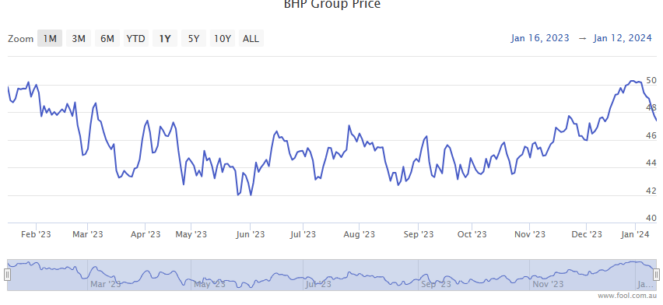From 23 October through to 2 January, BHP Group Ltd (ASX: BHP) shares gained a whopping 16.6%. And this is the biggest company on the ASX we're talking about, mind you, not some microcap stock.
On 2 January, shares in the S&P/ASX 200 Index (ASX: XJO) mining giant closed at $50.54.
But 2024 has started out on a more painful note for shareholders.
In morning trade today, BHP shares are down 0.9% at $46.73 apiece. That puts the miner's stock down 9.3% over the past two weeks.
For some context, the ASX 200 is down 2.2% over this same period.

Now it's not just BHP that's underperforming the benchmark.
Rio Tinto Ltd (ASX: RIO) shares are also down 9.3% over the two weeks, while the Fortescue Metals Group Ltd (ASX: FMG) share price is down 9.2%.
So, what's going on?
What's pressuring BHP shares?
As you're likely aware, BHP generates the bulk of its revenue from iron ore.
And it's the big swings in the iron ore price that sent BHP shares charging higher in the latter months of 2023.
On 23 October the iron ore price stood at just over US$115 per tonne. On 3 January, the industrial metal topped US$145 per tonne. That lift looks to have come from increased demand out of China, the top export market for Aussie iron ore, as Chinese steel makers increased their stockpiles ahead of the holiday season.
Since then, however, the iron ore price has slid to just under US$128 per tonne at the time of writing, with signs of deteriorating demand now seeing ASX 200 investors hitting the sell button.
Atop investor concerns over the increased tensions between Taiwan and China following the island nation's presidential elections, BHP shares, along with Rio Tinto and Fortescue shares, are looking at a potential pullback in iron ore demand from China.
Commenting on the iron ore price slide, Daniel Hynes, a senior commodity strategist at ANZ Group Holdings Ltd (ASX: ANZ) said (quoted by The Australian Financial Review), "Prices fell amid a deteriorating demand outlook."
If you own BHP shares or are looking into them, keep an eye out for China's December steel production data, which should be published tomorrow.
Robert Rennie head of commodity and carbon research at Westpac Banking Corp (ASX: WBC) said the bank's analysts will "be watching that very closely".
Rennie added that, "Other data is suggesting that December steel production was weak." Westpac believes the iron ore price has been elevated of late and is more likely to trade in the range of US$120 to US$130 per tonne.
Broker downgrades
In downgrades that may be related to the deteriorating outlook for steel demand from China, Morgans Financial has cut BHP shares to a 'hold' rating (courtesy of The Australian).
Morgans Financial also cut Rio Tinto shares to a 'hold'.
In its fourth-quarter update, released today, Rio Tinto noted that, "Resilient infrastructure and manufacturing investment, and an increase in the automotive sector and consumer goods, helped offset the prolonged weakness in the [Chinese] property market."
Looking ahead, the ASX 200 miner added:
Market confidence increased following strong fiscal easing and improvement in manufacturing and consumption levels. Stimulus measures are expected to drive a gradual recovery in 2024, albeit weighted towards the second half, with the real estate sector remaining weak.
So, should you be worried about your BHP shares?
As a long-term investor, I'd say no. Over a period of years, the past few weeks' retrace will likely be almost indiscernible on the price charts.
And with Rio Tinto expecting a second half, stimulus-driven recovery in China's economy in 2024, the current deterioration in Chinese steel demand could lead to an H2 expansion.









